Organisational Behaviour at Jet2Holidays: Performance and Motivation
VerifiedAdded on 2023/06/08
|14
|4719
|465
Report
AI Summary
This report delves into the organisational behaviour of Jet2Holidays, a leading travel agency. It examines the influence of organisational culture, power dynamics, and workplace politics on individual and team performance. The report explores how decision-makers exert power through coercive and reward tactics, and analyses the impact of politics on productivity and workplace environment. Furthermore, it evaluates the role of various cultural facets, such as power, role, individual-centric, and task cultures, in shaping employee behaviour. The report also assesses content and process theories of motivation, including Maslow's hierarchy of needs, Herzberg's two-factor theory, Vroom's expectancy theory, and goal-setting theory, to understand how they enable effective goal achievement. Finally, it contrasts effective and ineffective team dynamics, supported by team development theories to enhance cooperation and organisational performance, and critically evaluates the relevance of team development theories in the context of organisational behaviour concepts and philosophies.
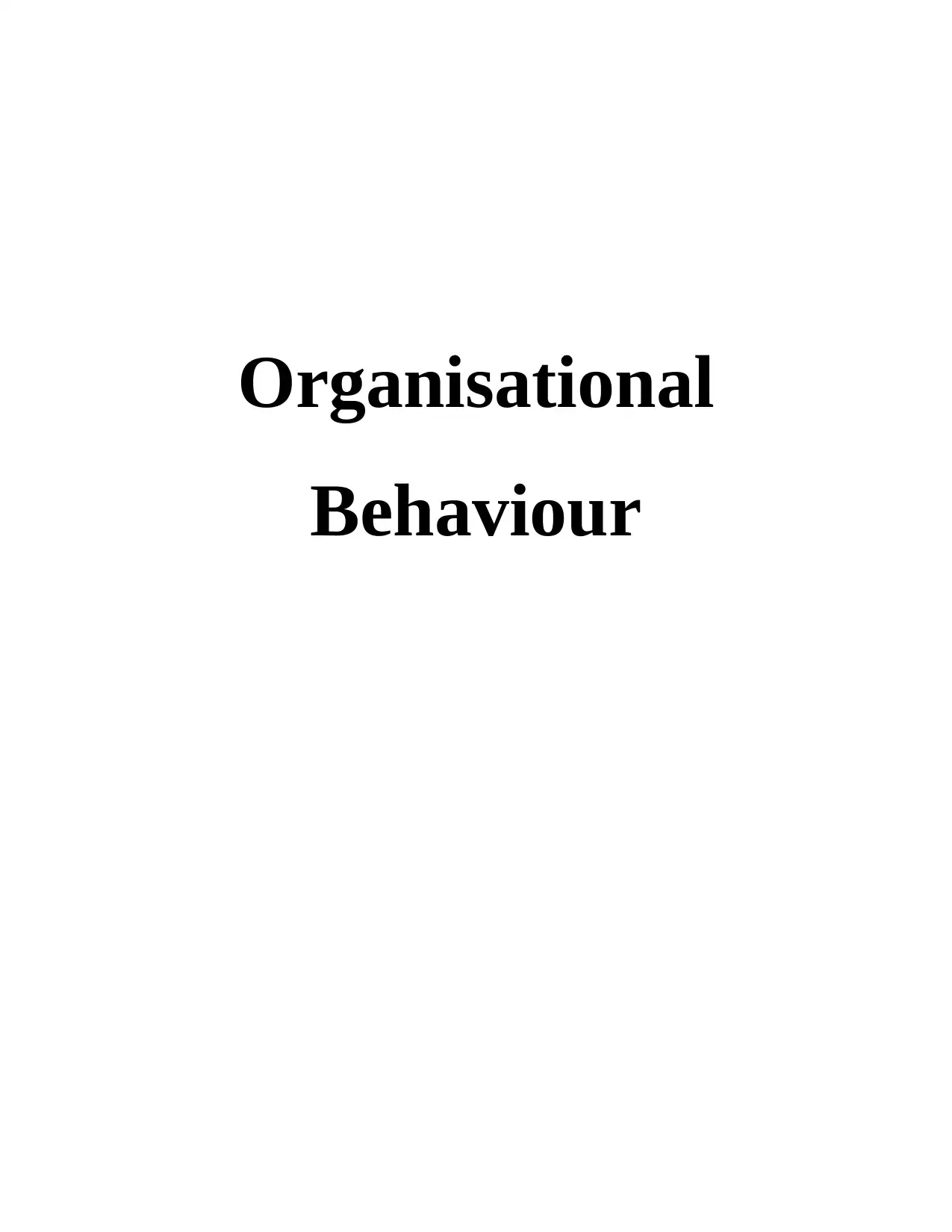
Organisational
Behaviour
Behaviour
Paraphrase This Document
Need a fresh take? Get an instant paraphrase of this document with our AI Paraphraser
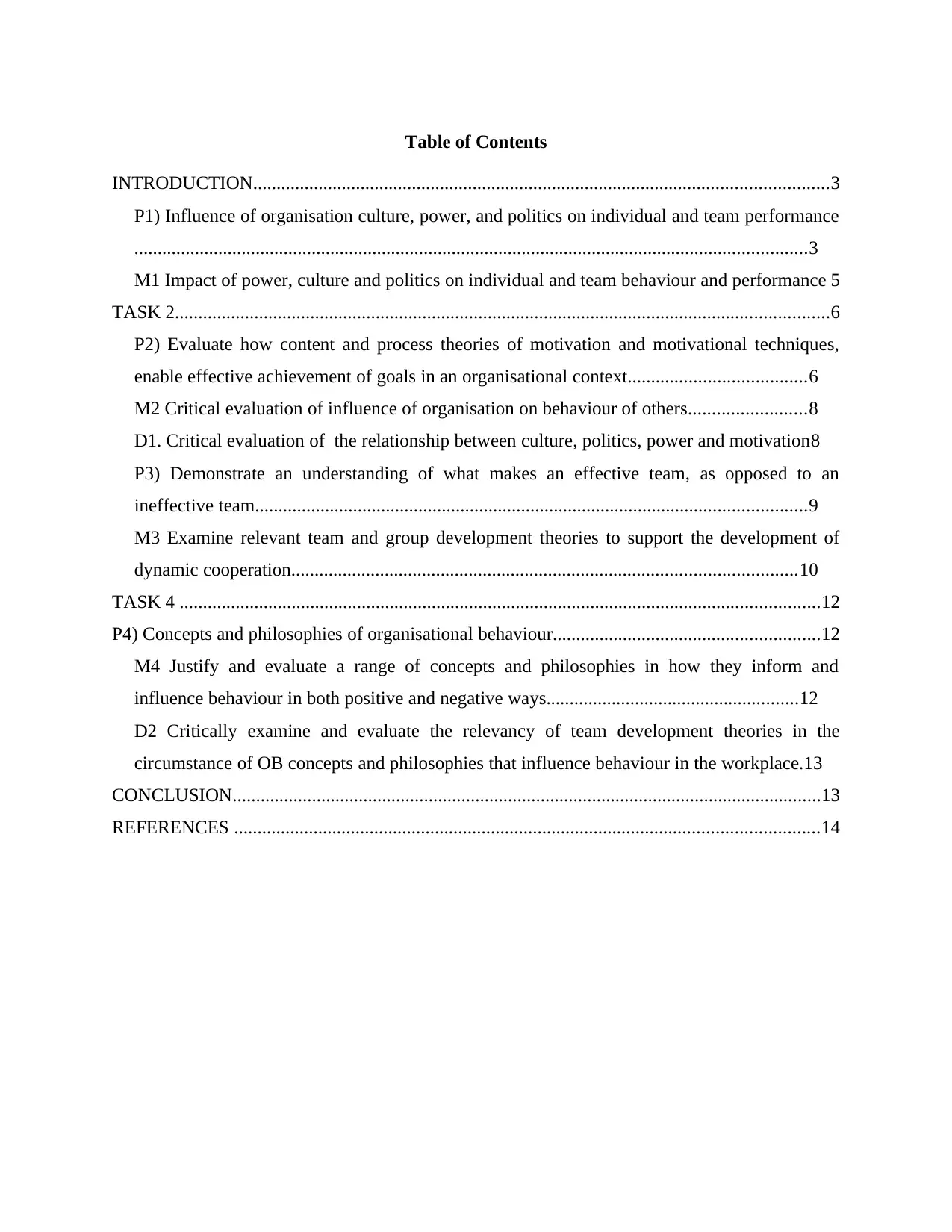
Table of Contents
INTRODUCTION...........................................................................................................................3
P1) Influence of organisation culture, power, and politics on individual and team performance
................................................................................................................................................3
M1 Impact of power, culture and politics on individual and team behaviour and performance 5
TASK 2............................................................................................................................................6
P2) Evaluate how content and process theories of motivation and motivational techniques,
enable effective achievement of goals in an organisational context......................................6
M2 Critical evaluation of influence of organisation on behaviour of others.........................8
D1. Critical evaluation of the relationship between culture, politics, power and motivation8
P3) Demonstrate an understanding of what makes an effective team, as opposed to an
ineffective team......................................................................................................................9
M3 Examine relevant team and group development theories to support the development of
dynamic cooperation............................................................................................................10
TASK 4 .........................................................................................................................................12
P4) Concepts and philosophies of organisational behaviour.........................................................12
M4 Justify and evaluate a range of concepts and philosophies in how they inform and
influence behaviour in both positive and negative ways......................................................12
D2 Critically examine and evaluate the relevancy of team development theories in the
circumstance of OB concepts and philosophies that influence behaviour in the workplace.13
CONCLUSION..............................................................................................................................13
REFERENCES .............................................................................................................................14
INTRODUCTION...........................................................................................................................3
P1) Influence of organisation culture, power, and politics on individual and team performance
................................................................................................................................................3
M1 Impact of power, culture and politics on individual and team behaviour and performance 5
TASK 2............................................................................................................................................6
P2) Evaluate how content and process theories of motivation and motivational techniques,
enable effective achievement of goals in an organisational context......................................6
M2 Critical evaluation of influence of organisation on behaviour of others.........................8
D1. Critical evaluation of the relationship between culture, politics, power and motivation8
P3) Demonstrate an understanding of what makes an effective team, as opposed to an
ineffective team......................................................................................................................9
M3 Examine relevant team and group development theories to support the development of
dynamic cooperation............................................................................................................10
TASK 4 .........................................................................................................................................12
P4) Concepts and philosophies of organisational behaviour.........................................................12
M4 Justify and evaluate a range of concepts and philosophies in how they inform and
influence behaviour in both positive and negative ways......................................................12
D2 Critically examine and evaluate the relevancy of team development theories in the
circumstance of OB concepts and philosophies that influence behaviour in the workplace.13
CONCLUSION..............................................................................................................................13
REFERENCES .............................................................................................................................14
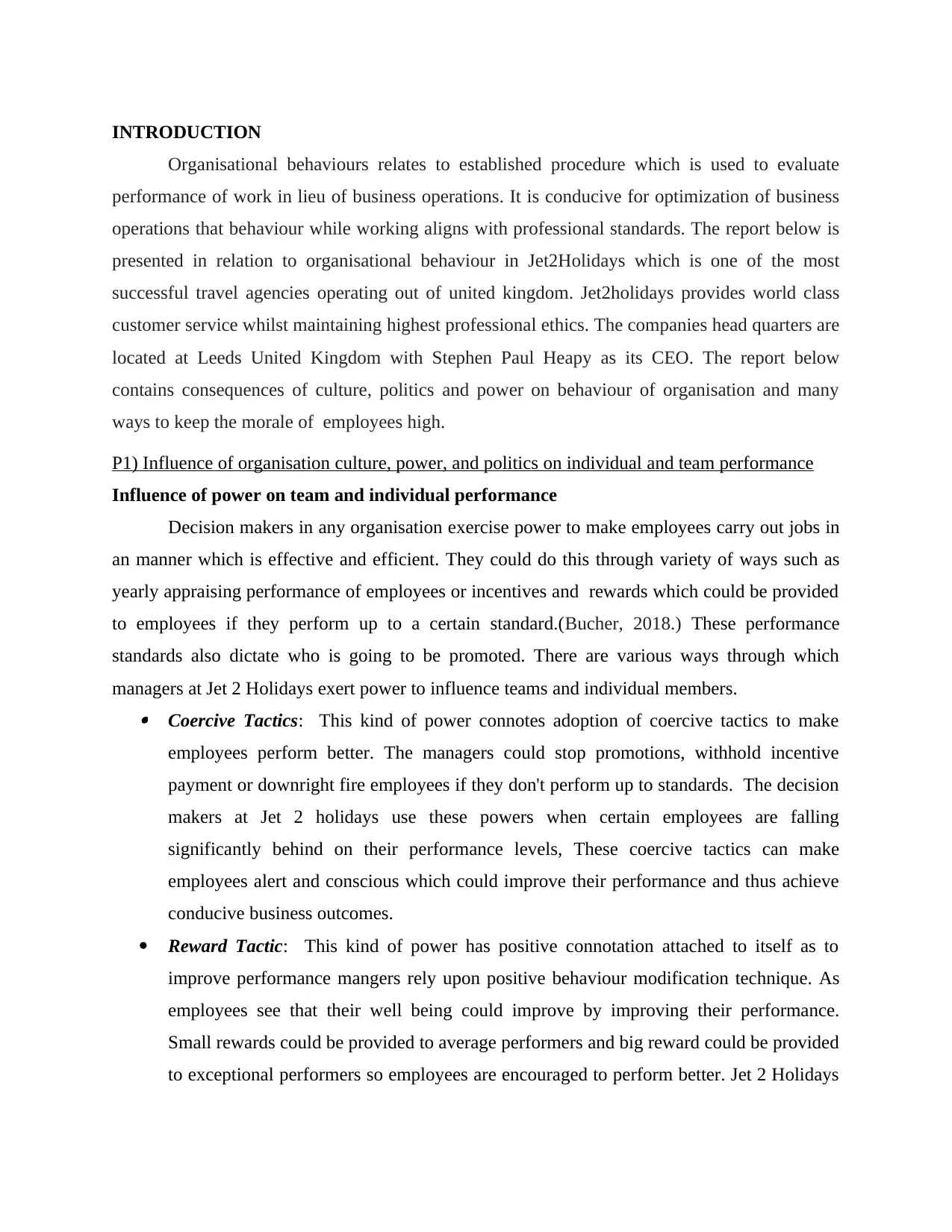
INTRODUCTION
Organisational behaviours relates to established procedure which is used to evaluate
performance of work in lieu of business operations. It is conducive for optimization of business
operations that behaviour while working aligns with professional standards. The report below is
presented in relation to organisational behaviour in Jet2Holidays which is one of the most
successful travel agencies operating out of united kingdom. Jet2holidays provides world class
customer service whilst maintaining highest professional ethics. The companies head quarters are
located at Leeds United Kingdom with Stephen Paul Heapy as its CEO. The report below
contains consequences of culture, politics and power on behaviour of organisation and many
ways to keep the morale of employees high.
P1) Influence of organisation culture, power, and politics on individual and team performance
Influence of power on team and individual performance
Decision makers in any organisation exercise power to make employees carry out jobs in
an manner which is effective and efficient. They could do this through variety of ways such as
yearly appraising performance of employees or incentives and rewards which could be provided
to employees if they perform up to a certain standard.(Bucher, 2018.) These performance
standards also dictate who is going to be promoted. There are various ways through which
managers at Jet 2 Holidays exert power to influence teams and individual members. Coercive Tactics: This kind of power connotes adoption of coercive tactics to make
employees perform better. The managers could stop promotions, withhold incentive
payment or downright fire employees if they don't perform up to standards. The decision
makers at Jet 2 holidays use these powers when certain employees are falling
significantly behind on their performance levels, These coercive tactics can make
employees alert and conscious which could improve their performance and thus achieve
conducive business outcomes.
Reward Tactic: This kind of power has positive connotation attached to itself as to
improve performance mangers rely upon positive behaviour modification technique. As
employees see that their well being could improve by improving their performance.
Small rewards could be provided to average performers and big reward could be provided
to exceptional performers so employees are encouraged to perform better. Jet 2 Holidays
Organisational behaviours relates to established procedure which is used to evaluate
performance of work in lieu of business operations. It is conducive for optimization of business
operations that behaviour while working aligns with professional standards. The report below is
presented in relation to organisational behaviour in Jet2Holidays which is one of the most
successful travel agencies operating out of united kingdom. Jet2holidays provides world class
customer service whilst maintaining highest professional ethics. The companies head quarters are
located at Leeds United Kingdom with Stephen Paul Heapy as its CEO. The report below
contains consequences of culture, politics and power on behaviour of organisation and many
ways to keep the morale of employees high.
P1) Influence of organisation culture, power, and politics on individual and team performance
Influence of power on team and individual performance
Decision makers in any organisation exercise power to make employees carry out jobs in
an manner which is effective and efficient. They could do this through variety of ways such as
yearly appraising performance of employees or incentives and rewards which could be provided
to employees if they perform up to a certain standard.(Bucher, 2018.) These performance
standards also dictate who is going to be promoted. There are various ways through which
managers at Jet 2 Holidays exert power to influence teams and individual members. Coercive Tactics: This kind of power connotes adoption of coercive tactics to make
employees perform better. The managers could stop promotions, withhold incentive
payment or downright fire employees if they don't perform up to standards. The decision
makers at Jet 2 holidays use these powers when certain employees are falling
significantly behind on their performance levels, These coercive tactics can make
employees alert and conscious which could improve their performance and thus achieve
conducive business outcomes.
Reward Tactic: This kind of power has positive connotation attached to itself as to
improve performance mangers rely upon positive behaviour modification technique. As
employees see that their well being could improve by improving their performance.
Small rewards could be provided to average performers and big reward could be provided
to exceptional performers so employees are encouraged to perform better. Jet 2 Holidays
⊘ This is a preview!⊘
Do you want full access?
Subscribe today to unlock all pages.

Trusted by 1+ million students worldwide
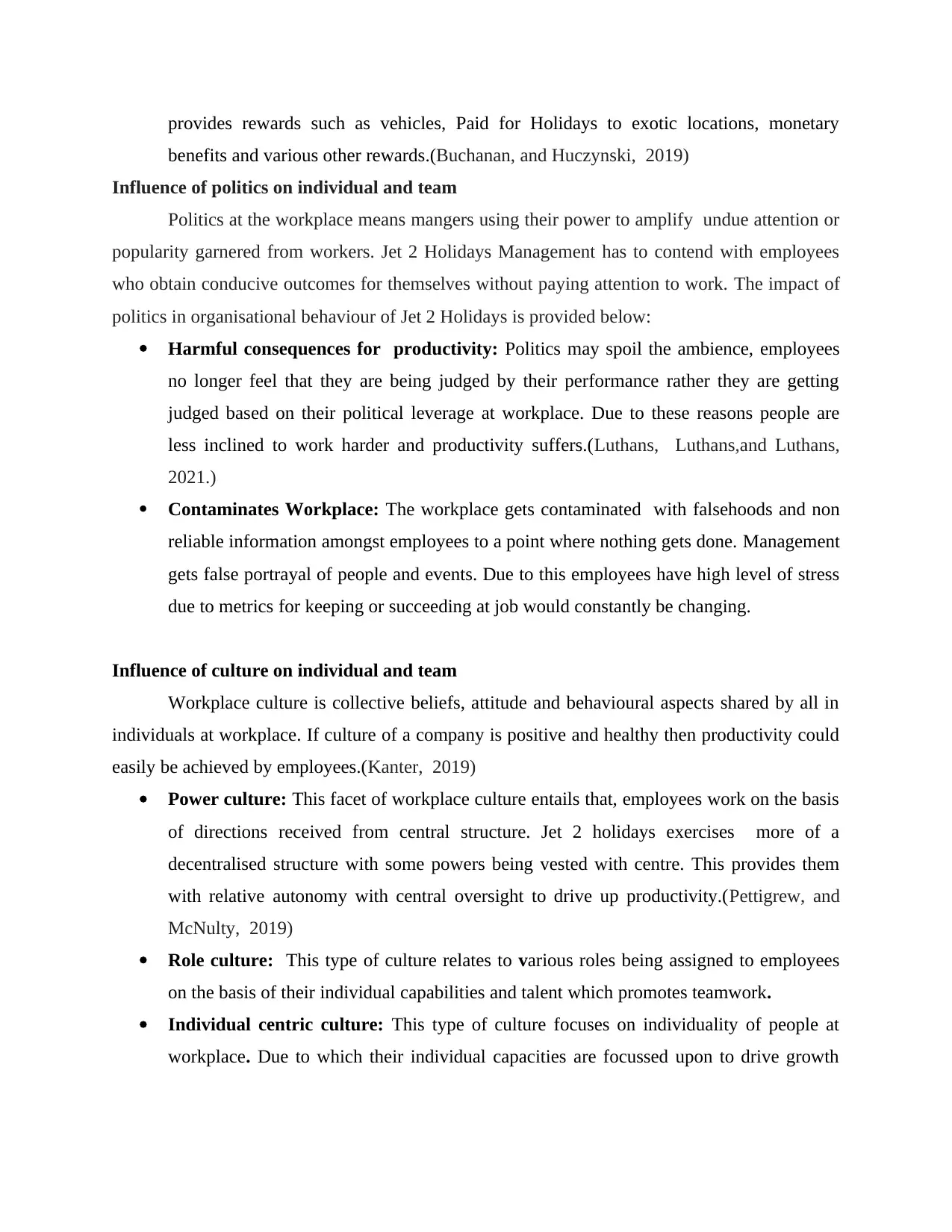
provides rewards such as vehicles, Paid for Holidays to exotic locations, monetary
benefits and various other rewards.(Buchanan, and Huczynski, 2019)
Influence of politics on individual and team
Politics at the workplace means mangers using their power to amplify undue attention or
popularity garnered from workers. Jet 2 Holidays Management has to contend with employees
who obtain conducive outcomes for themselves without paying attention to work. The impact of
politics in organisational behaviour of Jet 2 Holidays is provided below:
Harmful consequences for productivity: Politics may spoil the ambience, employees
no longer feel that they are being judged by their performance rather they are getting
judged based on their political leverage at workplace. Due to these reasons people are
less inclined to work harder and productivity suffers.(Luthans, Luthans,and Luthans,
2021.)
Contaminates Workplace: The workplace gets contaminated with falsehoods and non
reliable information amongst employees to a point where nothing gets done. Management
gets false portrayal of people and events. Due to this employees have high level of stress
due to metrics for keeping or succeeding at job would constantly be changing.
Influence of culture on individual and team
Workplace culture is collective beliefs, attitude and behavioural aspects shared by all in
individuals at workplace. If culture of a company is positive and healthy then productivity could
easily be achieved by employees.(Kanter, 2019)
Power culture: This facet of workplace culture entails that, employees work on the basis
of directions received from central structure. Jet 2 holidays exercises more of a
decentralised structure with some powers being vested with centre. This provides them
with relative autonomy with central oversight to drive up productivity.(Pettigrew, and
McNulty, 2019)
Role culture: This type of culture relates to various roles being assigned to employees
on the basis of their individual capabilities and talent which promotes teamwork.
Individual centric culture: This type of culture focuses on individuality of people at
workplace. Due to which their individual capacities are focussed upon to drive growth
benefits and various other rewards.(Buchanan, and Huczynski, 2019)
Influence of politics on individual and team
Politics at the workplace means mangers using their power to amplify undue attention or
popularity garnered from workers. Jet 2 Holidays Management has to contend with employees
who obtain conducive outcomes for themselves without paying attention to work. The impact of
politics in organisational behaviour of Jet 2 Holidays is provided below:
Harmful consequences for productivity: Politics may spoil the ambience, employees
no longer feel that they are being judged by their performance rather they are getting
judged based on their political leverage at workplace. Due to these reasons people are
less inclined to work harder and productivity suffers.(Luthans, Luthans,and Luthans,
2021.)
Contaminates Workplace: The workplace gets contaminated with falsehoods and non
reliable information amongst employees to a point where nothing gets done. Management
gets false portrayal of people and events. Due to this employees have high level of stress
due to metrics for keeping or succeeding at job would constantly be changing.
Influence of culture on individual and team
Workplace culture is collective beliefs, attitude and behavioural aspects shared by all in
individuals at workplace. If culture of a company is positive and healthy then productivity could
easily be achieved by employees.(Kanter, 2019)
Power culture: This facet of workplace culture entails that, employees work on the basis
of directions received from central structure. Jet 2 holidays exercises more of a
decentralised structure with some powers being vested with centre. This provides them
with relative autonomy with central oversight to drive up productivity.(Pettigrew, and
McNulty, 2019)
Role culture: This type of culture relates to various roles being assigned to employees
on the basis of their individual capabilities and talent which promotes teamwork.
Individual centric culture: This type of culture focuses on individuality of people at
workplace. Due to which their individual capacities are focussed upon to drive growth
Paraphrase This Document
Need a fresh take? Get an instant paraphrase of this document with our AI Paraphraser
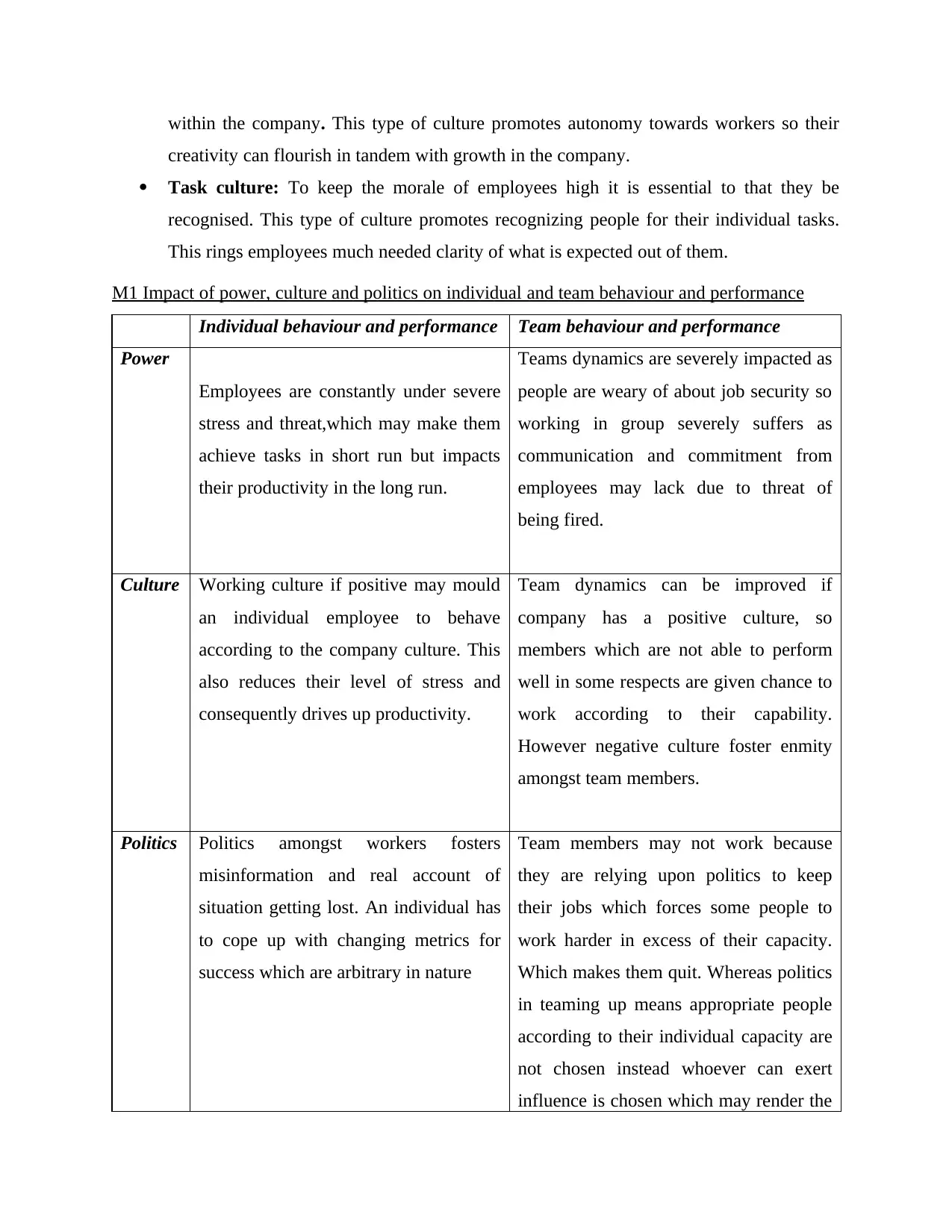
within the company. This type of culture promotes autonomy towards workers so their
creativity can flourish in tandem with growth in the company.
Task culture: To keep the morale of employees high it is essential to that they be
recognised. This type of culture promotes recognizing people for their individual tasks.
This rings employees much needed clarity of what is expected out of them.
M1 Impact of power, culture and politics on individual and team behaviour and performance
Individual behaviour and performance Team behaviour and performance
Power
Employees are constantly under severe
stress and threat,which may make them
achieve tasks in short run but impacts
their productivity in the long run.
Teams dynamics are severely impacted as
people are weary of about job security so
working in group severely suffers as
communication and commitment from
employees may lack due to threat of
being fired.
Culture Working culture if positive may mould
an individual employee to behave
according to the company culture. This
also reduces their level of stress and
consequently drives up productivity.
Team dynamics can be improved if
company has a positive culture, so
members which are not able to perform
well in some respects are given chance to
work according to their capability.
However negative culture foster enmity
amongst team members.
Politics Politics amongst workers fosters
misinformation and real account of
situation getting lost. An individual has
to cope up with changing metrics for
success which are arbitrary in nature
Team members may not work because
they are relying upon politics to keep
their jobs which forces some people to
work harder in excess of their capacity.
Which makes them quit. Whereas politics
in teaming up means appropriate people
according to their individual capacity are
not chosen instead whoever can exert
influence is chosen which may render the
creativity can flourish in tandem with growth in the company.
Task culture: To keep the morale of employees high it is essential to that they be
recognised. This type of culture promotes recognizing people for their individual tasks.
This rings employees much needed clarity of what is expected out of them.
M1 Impact of power, culture and politics on individual and team behaviour and performance
Individual behaviour and performance Team behaviour and performance
Power
Employees are constantly under severe
stress and threat,which may make them
achieve tasks in short run but impacts
their productivity in the long run.
Teams dynamics are severely impacted as
people are weary of about job security so
working in group severely suffers as
communication and commitment from
employees may lack due to threat of
being fired.
Culture Working culture if positive may mould
an individual employee to behave
according to the company culture. This
also reduces their level of stress and
consequently drives up productivity.
Team dynamics can be improved if
company has a positive culture, so
members which are not able to perform
well in some respects are given chance to
work according to their capability.
However negative culture foster enmity
amongst team members.
Politics Politics amongst workers fosters
misinformation and real account of
situation getting lost. An individual has
to cope up with changing metrics for
success which are arbitrary in nature
Team members may not work because
they are relying upon politics to keep
their jobs which forces some people to
work harder in excess of their capacity.
Which makes them quit. Whereas politics
in teaming up means appropriate people
according to their individual capacity are
not chosen instead whoever can exert
influence is chosen which may render the
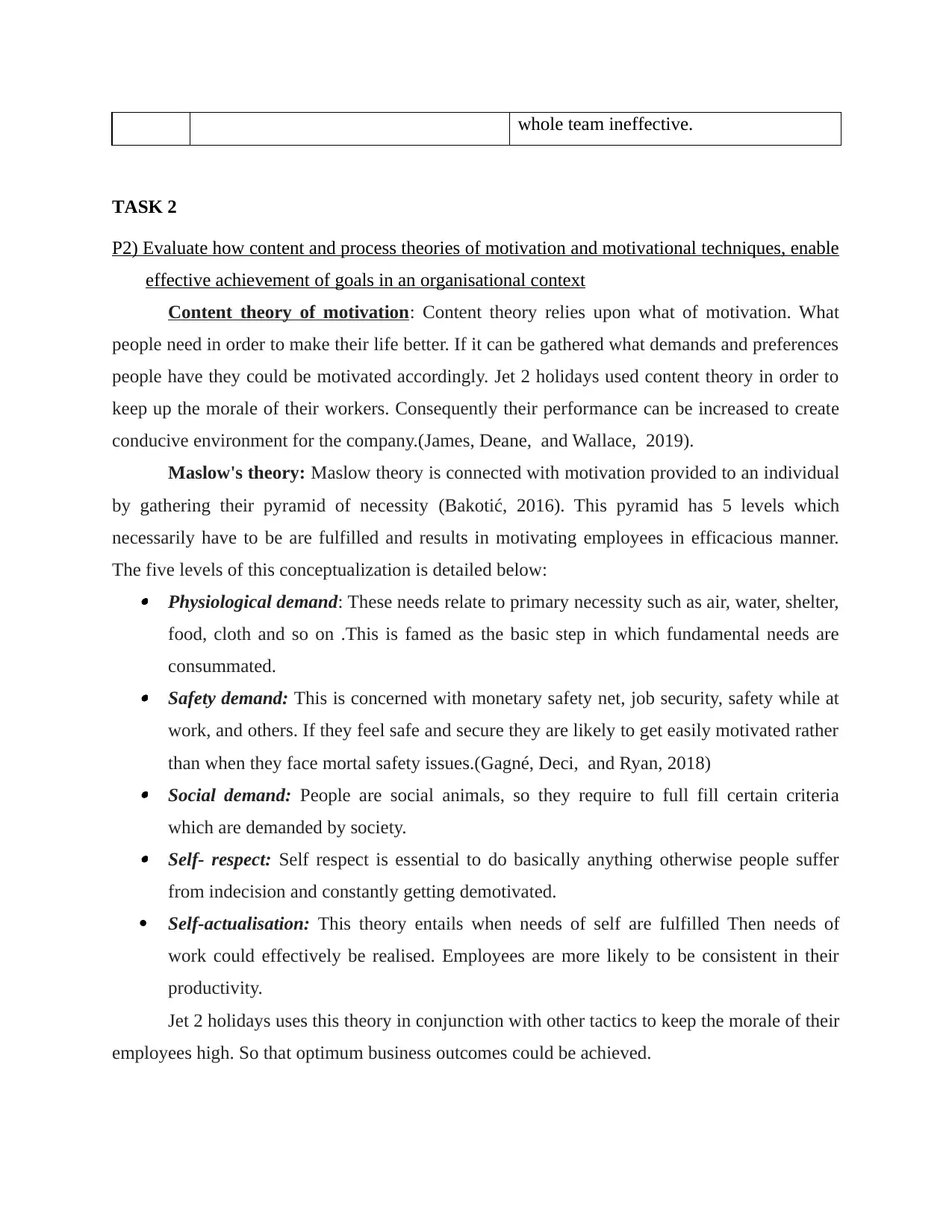
whole team ineffective.
TASK 2
P2) Evaluate how content and process theories of motivation and motivational techniques, enable
effective achievement of goals in an organisational context
Content theory of motivation: Content theory relies upon what of motivation. What
people need in order to make their life better. If it can be gathered what demands and preferences
people have they could be motivated accordingly. Jet 2 holidays used content theory in order to
keep up the morale of their workers. Consequently their performance can be increased to create
conducive environment for the company.(James, Deane, and Wallace, 2019).
Maslow's theory: Maslow theory is connected with motivation provided to an individual
by gathering their pyramid of necessity (Bakotić, 2016). This pyramid has 5 levels which
necessarily have to be are fulfilled and results in motivating employees in efficacious manner.
The five levels of this conceptualization is detailed below: Physiological demand: These needs relate to primary necessity such as air, water, shelter,
food, cloth and so on .This is famed as the basic step in which fundamental needs are
consummated. Safety demand: This is concerned with monetary safety net, job security, safety while at
work, and others. If they feel safe and secure they are likely to get easily motivated rather
than when they face mortal safety issues.(Gagné, Deci, and Ryan, 2018) Social demand: People are social animals, so they require to full fill certain criteria
which are demanded by society. Self- respect: Self respect is essential to do basically anything otherwise people suffer
from indecision and constantly getting demotivated.
Self-actualisation: This theory entails when needs of self are fulfilled Then needs of
work could effectively be realised. Employees are more likely to be consistent in their
productivity.
Jet 2 holidays uses this theory in conjunction with other tactics to keep the morale of their
employees high. So that optimum business outcomes could be achieved.
TASK 2
P2) Evaluate how content and process theories of motivation and motivational techniques, enable
effective achievement of goals in an organisational context
Content theory of motivation: Content theory relies upon what of motivation. What
people need in order to make their life better. If it can be gathered what demands and preferences
people have they could be motivated accordingly. Jet 2 holidays used content theory in order to
keep up the morale of their workers. Consequently their performance can be increased to create
conducive environment for the company.(James, Deane, and Wallace, 2019).
Maslow's theory: Maslow theory is connected with motivation provided to an individual
by gathering their pyramid of necessity (Bakotić, 2016). This pyramid has 5 levels which
necessarily have to be are fulfilled and results in motivating employees in efficacious manner.
The five levels of this conceptualization is detailed below: Physiological demand: These needs relate to primary necessity such as air, water, shelter,
food, cloth and so on .This is famed as the basic step in which fundamental needs are
consummated. Safety demand: This is concerned with monetary safety net, job security, safety while at
work, and others. If they feel safe and secure they are likely to get easily motivated rather
than when they face mortal safety issues.(Gagné, Deci, and Ryan, 2018) Social demand: People are social animals, so they require to full fill certain criteria
which are demanded by society. Self- respect: Self respect is essential to do basically anything otherwise people suffer
from indecision and constantly getting demotivated.
Self-actualisation: This theory entails when needs of self are fulfilled Then needs of
work could effectively be realised. Employees are more likely to be consistent in their
productivity.
Jet 2 holidays uses this theory in conjunction with other tactics to keep the morale of their
employees high. So that optimum business outcomes could be achieved.
⊘ This is a preview!⊘
Do you want full access?
Subscribe today to unlock all pages.

Trusted by 1+ million students worldwide
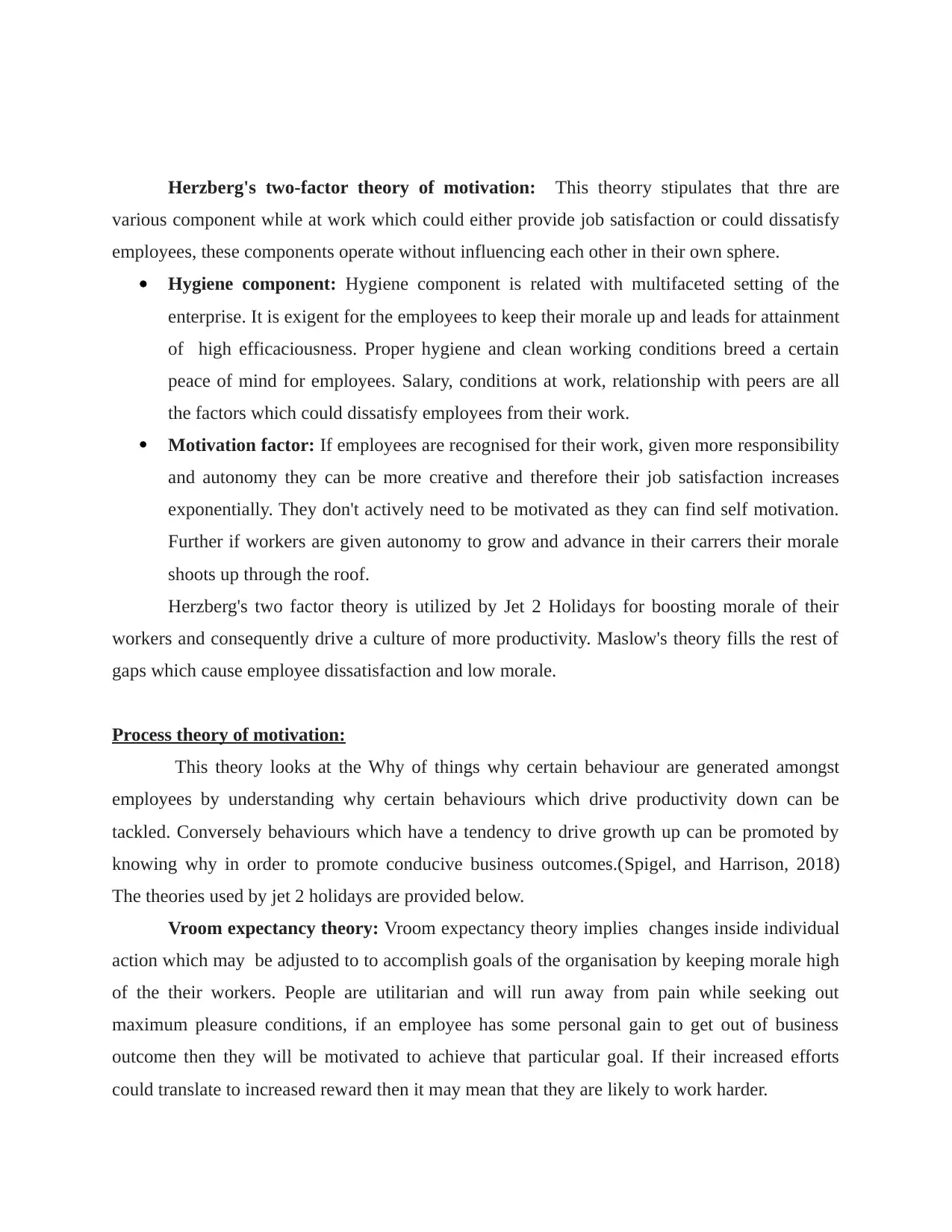
Herzberg's two-factor theory of motivation: This theorry stipulates that thre are
various component while at work which could either provide job satisfaction or could dissatisfy
employees, these components operate without influencing each other in their own sphere.
Hygiene component: Hygiene component is related with multifaceted setting of the
enterprise. It is exigent for the employees to keep their morale up and leads for attainment
of high efficaciousness. Proper hygiene and clean working conditions breed a certain
peace of mind for employees. Salary, conditions at work, relationship with peers are all
the factors which could dissatisfy employees from their work.
Motivation factor: If employees are recognised for their work, given more responsibility
and autonomy they can be more creative and therefore their job satisfaction increases
exponentially. They don't actively need to be motivated as they can find self motivation.
Further if workers are given autonomy to grow and advance in their carrers their morale
shoots up through the roof.
Herzberg's two factor theory is utilized by Jet 2 Holidays for boosting morale of their
workers and consequently drive a culture of more productivity. Maslow's theory fills the rest of
gaps which cause employee dissatisfaction and low morale.
Process theory of motivation:
This theory looks at the Why of things why certain behaviour are generated amongst
employees by understanding why certain behaviours which drive productivity down can be
tackled. Conversely behaviours which have a tendency to drive growth up can be promoted by
knowing why in order to promote conducive business outcomes.(Spigel, and Harrison, 2018)
The theories used by jet 2 holidays are provided below.
Vroom expectancy theory: Vroom expectancy theory implies changes inside individual
action which may be adjusted to to accomplish goals of the organisation by keeping morale high
of the their workers. People are utilitarian and will run away from pain while seeking out
maximum pleasure conditions, if an employee has some personal gain to get out of business
outcome then they will be motivated to achieve that particular goal. If their increased efforts
could translate to increased reward then it may mean that they are likely to work harder.
various component while at work which could either provide job satisfaction or could dissatisfy
employees, these components operate without influencing each other in their own sphere.
Hygiene component: Hygiene component is related with multifaceted setting of the
enterprise. It is exigent for the employees to keep their morale up and leads for attainment
of high efficaciousness. Proper hygiene and clean working conditions breed a certain
peace of mind for employees. Salary, conditions at work, relationship with peers are all
the factors which could dissatisfy employees from their work.
Motivation factor: If employees are recognised for their work, given more responsibility
and autonomy they can be more creative and therefore their job satisfaction increases
exponentially. They don't actively need to be motivated as they can find self motivation.
Further if workers are given autonomy to grow and advance in their carrers their morale
shoots up through the roof.
Herzberg's two factor theory is utilized by Jet 2 Holidays for boosting morale of their
workers and consequently drive a culture of more productivity. Maslow's theory fills the rest of
gaps which cause employee dissatisfaction and low morale.
Process theory of motivation:
This theory looks at the Why of things why certain behaviour are generated amongst
employees by understanding why certain behaviours which drive productivity down can be
tackled. Conversely behaviours which have a tendency to drive growth up can be promoted by
knowing why in order to promote conducive business outcomes.(Spigel, and Harrison, 2018)
The theories used by jet 2 holidays are provided below.
Vroom expectancy theory: Vroom expectancy theory implies changes inside individual
action which may be adjusted to to accomplish goals of the organisation by keeping morale high
of the their workers. People are utilitarian and will run away from pain while seeking out
maximum pleasure conditions, if an employee has some personal gain to get out of business
outcome then they will be motivated to achieve that particular goal. If their increased efforts
could translate to increased reward then it may mean that they are likely to work harder.
Paraphrase This Document
Need a fresh take? Get an instant paraphrase of this document with our AI Paraphraser
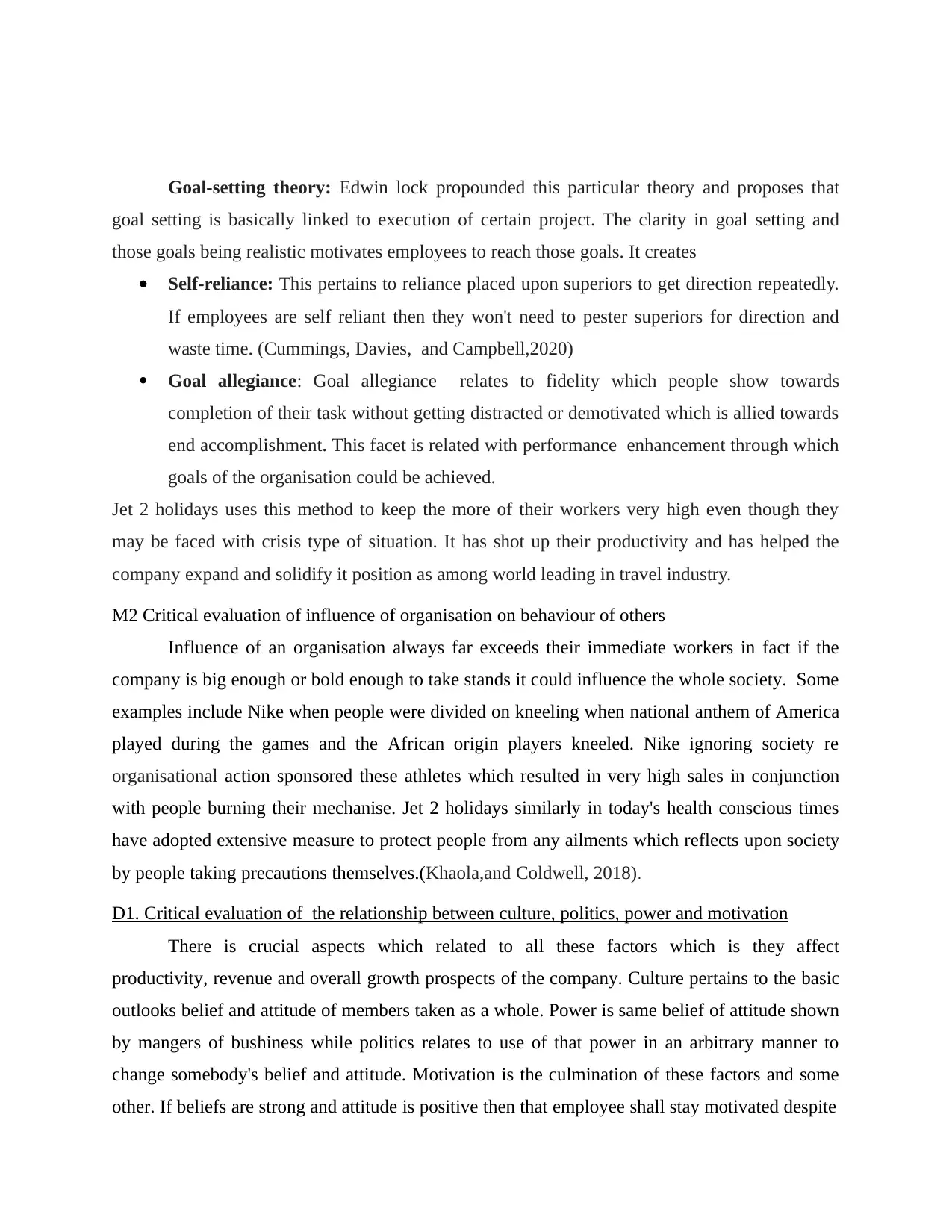
Goal-setting theory: Edwin lock propounded this particular theory and proposes that
goal setting is basically linked to execution of certain project. The clarity in goal setting and
those goals being realistic motivates employees to reach those goals. It creates
Self-reliance: This pertains to reliance placed upon superiors to get direction repeatedly.
If employees are self reliant then they won't need to pester superiors for direction and
waste time. (Cummings, Davies, and Campbell,2020)
Goal allegiance: Goal allegiance relates to fidelity which people show towards
completion of their task without getting distracted or demotivated which is allied towards
end accomplishment. This facet is related with performance enhancement through which
goals of the organisation could be achieved.
Jet 2 holidays uses this method to keep the more of their workers very high even though they
may be faced with crisis type of situation. It has shot up their productivity and has helped the
company expand and solidify it position as among world leading in travel industry.
M2 Critical evaluation of influence of organisation on behaviour of others
Influence of an organisation always far exceeds their immediate workers in fact if the
company is big enough or bold enough to take stands it could influence the whole society. Some
examples include Nike when people were divided on kneeling when national anthem of America
played during the games and the African origin players kneeled. Nike ignoring society re
organisational action sponsored these athletes which resulted in very high sales in conjunction
with people burning their mechanise. Jet 2 holidays similarly in today's health conscious times
have adopted extensive measure to protect people from any ailments which reflects upon society
by people taking precautions themselves.(Khaola,and Coldwell, 2018).
D1. Critical evaluation of the relationship between culture, politics, power and motivation
There is crucial aspects which related to all these factors which is they affect
productivity, revenue and overall growth prospects of the company. Culture pertains to the basic
outlooks belief and attitude of members taken as a whole. Power is same belief of attitude shown
by mangers of bushiness while politics relates to use of that power in an arbitrary manner to
change somebody's belief and attitude. Motivation is the culmination of these factors and some
other. If beliefs are strong and attitude is positive then that employee shall stay motivated despite
goal setting is basically linked to execution of certain project. The clarity in goal setting and
those goals being realistic motivates employees to reach those goals. It creates
Self-reliance: This pertains to reliance placed upon superiors to get direction repeatedly.
If employees are self reliant then they won't need to pester superiors for direction and
waste time. (Cummings, Davies, and Campbell,2020)
Goal allegiance: Goal allegiance relates to fidelity which people show towards
completion of their task without getting distracted or demotivated which is allied towards
end accomplishment. This facet is related with performance enhancement through which
goals of the organisation could be achieved.
Jet 2 holidays uses this method to keep the more of their workers very high even though they
may be faced with crisis type of situation. It has shot up their productivity and has helped the
company expand and solidify it position as among world leading in travel industry.
M2 Critical evaluation of influence of organisation on behaviour of others
Influence of an organisation always far exceeds their immediate workers in fact if the
company is big enough or bold enough to take stands it could influence the whole society. Some
examples include Nike when people were divided on kneeling when national anthem of America
played during the games and the African origin players kneeled. Nike ignoring society re
organisational action sponsored these athletes which resulted in very high sales in conjunction
with people burning their mechanise. Jet 2 holidays similarly in today's health conscious times
have adopted extensive measure to protect people from any ailments which reflects upon society
by people taking precautions themselves.(Khaola,and Coldwell, 2018).
D1. Critical evaluation of the relationship between culture, politics, power and motivation
There is crucial aspects which related to all these factors which is they affect
productivity, revenue and overall growth prospects of the company. Culture pertains to the basic
outlooks belief and attitude of members taken as a whole. Power is same belief of attitude shown
by mangers of bushiness while politics relates to use of that power in an arbitrary manner to
change somebody's belief and attitude. Motivation is the culmination of these factors and some
other. If beliefs are strong and attitude is positive then that employee shall stay motivated despite
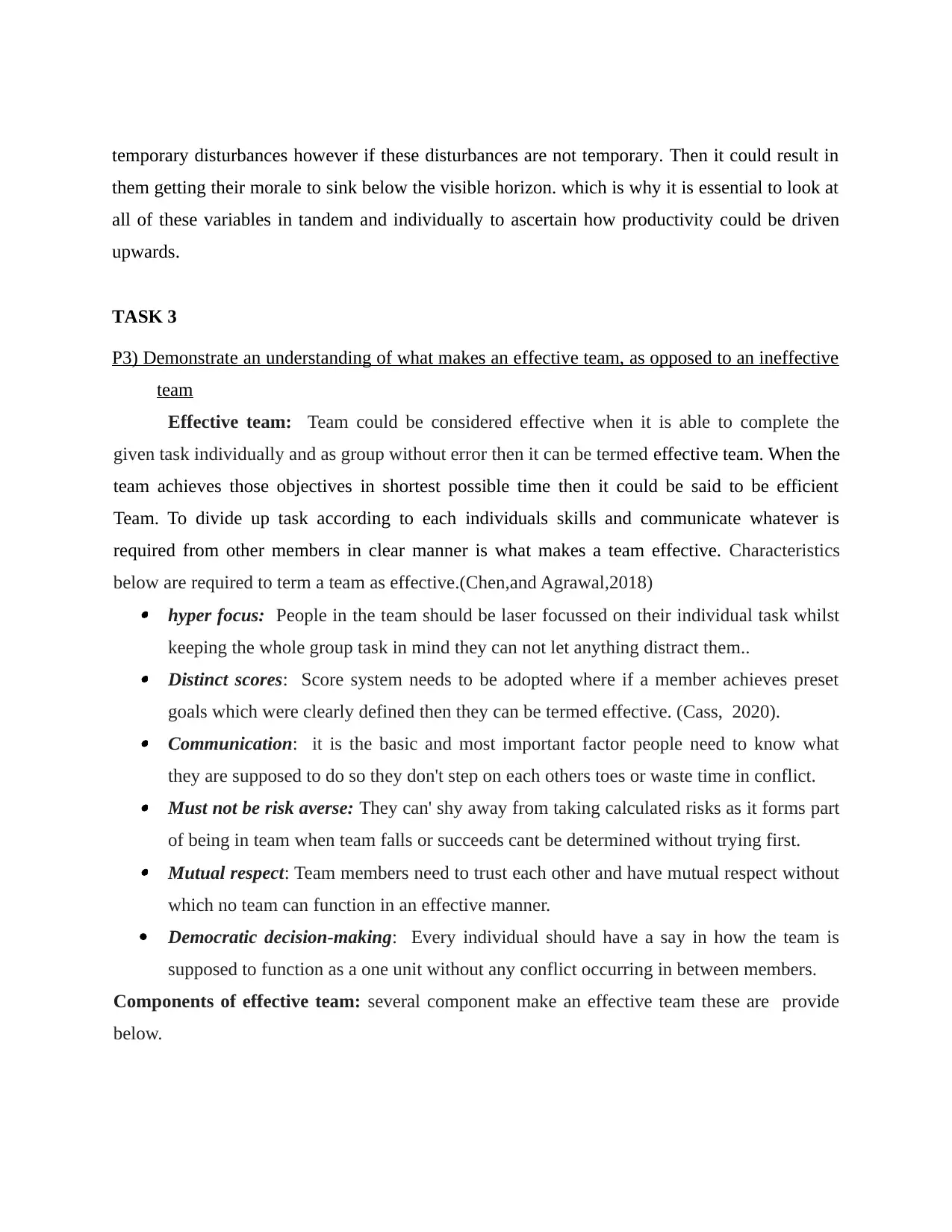
temporary disturbances however if these disturbances are not temporary. Then it could result in
them getting their morale to sink below the visible horizon. which is why it is essential to look at
all of these variables in tandem and individually to ascertain how productivity could be driven
upwards.
TASK 3
P3) Demonstrate an understanding of what makes an effective team, as opposed to an ineffective
team
Effective team: Team could be considered effective when it is able to complete the
given task individually and as group without error then it can be termed effective team. When the
team achieves those objectives in shortest possible time then it could be said to be efficient
Team. To divide up task according to each individuals skills and communicate whatever is
required from other members in clear manner is what makes a team effective. Characteristics
below are required to term a team as effective.(Chen,and Agrawal,2018) hyper focus: People in the team should be laser focussed on their individual task whilst
keeping the whole group task in mind they can not let anything distract them.. Distinct scores: Score system needs to be adopted where if a member achieves preset
goals which were clearly defined then they can be termed effective. (Cass, 2020). Communication: it is the basic and most important factor people need to know what
they are supposed to do so they don't step on each others toes or waste time in conflict. Must not be risk averse: They can' shy away from taking calculated risks as it forms part
of being in team when team falls or succeeds cant be determined without trying first. Mutual respect: Team members need to trust each other and have mutual respect without
which no team can function in an effective manner.
Democratic decision-making: Every individual should have a say in how the team is
supposed to function as a one unit without any conflict occurring in between members.
Components of effective team: several component make an effective team these are provide
below.
them getting their morale to sink below the visible horizon. which is why it is essential to look at
all of these variables in tandem and individually to ascertain how productivity could be driven
upwards.
TASK 3
P3) Demonstrate an understanding of what makes an effective team, as opposed to an ineffective
team
Effective team: Team could be considered effective when it is able to complete the
given task individually and as group without error then it can be termed effective team. When the
team achieves those objectives in shortest possible time then it could be said to be efficient
Team. To divide up task according to each individuals skills and communicate whatever is
required from other members in clear manner is what makes a team effective. Characteristics
below are required to term a team as effective.(Chen,and Agrawal,2018) hyper focus: People in the team should be laser focussed on their individual task whilst
keeping the whole group task in mind they can not let anything distract them.. Distinct scores: Score system needs to be adopted where if a member achieves preset
goals which were clearly defined then they can be termed effective. (Cass, 2020). Communication: it is the basic and most important factor people need to know what
they are supposed to do so they don't step on each others toes or waste time in conflict. Must not be risk averse: They can' shy away from taking calculated risks as it forms part
of being in team when team falls or succeeds cant be determined without trying first. Mutual respect: Team members need to trust each other and have mutual respect without
which no team can function in an effective manner.
Democratic decision-making: Every individual should have a say in how the team is
supposed to function as a one unit without any conflict occurring in between members.
Components of effective team: several component make an effective team these are provide
below.
⊘ This is a preview!⊘
Do you want full access?
Subscribe today to unlock all pages.

Trusted by 1+ million students worldwide
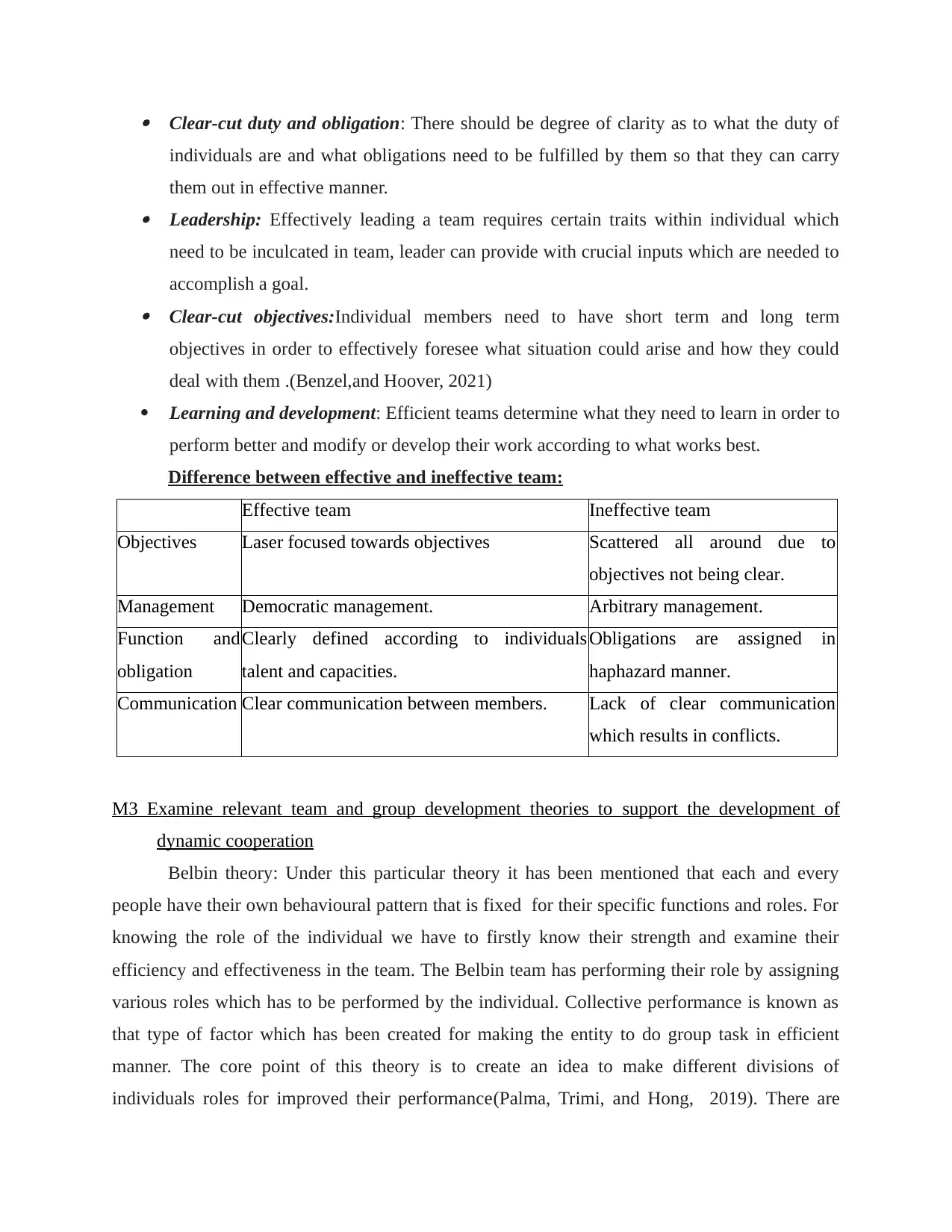
Clear-cut duty and obligation: There should be degree of clarity as to what the duty of
individuals are and what obligations need to be fulfilled by them so that they can carry
them out in effective manner. Leadership: Effectively leading a team requires certain traits within individual which
need to be inculcated in team, leader can provide with crucial inputs which are needed to
accomplish a goal. Clear-cut objectives:Individual members need to have short term and long term
objectives in order to effectively foresee what situation could arise and how they could
deal with them .(Benzel,and Hoover, 2021)
Learning and development: Efficient teams determine what they need to learn in order to
perform better and modify or develop their work according to what works best.
Difference between effective and ineffective team:
Effective team Ineffective team
Objectives Laser focused towards objectives Scattered all around due to
objectives not being clear.
Management Democratic management. Arbitrary management.
Function and
obligation
Clearly defined according to individuals
talent and capacities.
Obligations are assigned in
haphazard manner.
Communication Clear communication between members. Lack of clear communication
which results in conflicts.
M3 Examine relevant team and group development theories to support the development of
dynamic cooperation
Belbin theory: Under this particular theory it has been mentioned that each and every
people have their own behavioural pattern that is fixed for their specific functions and roles. For
knowing the role of the individual we have to firstly know their strength and examine their
efficiency and effectiveness in the team. The Belbin team has performing their role by assigning
various roles which has to be performed by the individual. Collective performance is known as
that type of factor which has been created for making the entity to do group task in efficient
manner. The core point of this theory is to create an idea to make different divisions of
individuals roles for improved their performance(Palma, Trimi, and Hong, 2019). There are
individuals are and what obligations need to be fulfilled by them so that they can carry
them out in effective manner. Leadership: Effectively leading a team requires certain traits within individual which
need to be inculcated in team, leader can provide with crucial inputs which are needed to
accomplish a goal. Clear-cut objectives:Individual members need to have short term and long term
objectives in order to effectively foresee what situation could arise and how they could
deal with them .(Benzel,and Hoover, 2021)
Learning and development: Efficient teams determine what they need to learn in order to
perform better and modify or develop their work according to what works best.
Difference between effective and ineffective team:
Effective team Ineffective team
Objectives Laser focused towards objectives Scattered all around due to
objectives not being clear.
Management Democratic management. Arbitrary management.
Function and
obligation
Clearly defined according to individuals
talent and capacities.
Obligations are assigned in
haphazard manner.
Communication Clear communication between members. Lack of clear communication
which results in conflicts.
M3 Examine relevant team and group development theories to support the development of
dynamic cooperation
Belbin theory: Under this particular theory it has been mentioned that each and every
people have their own behavioural pattern that is fixed for their specific functions and roles. For
knowing the role of the individual we have to firstly know their strength and examine their
efficiency and effectiveness in the team. The Belbin team has performing their role by assigning
various roles which has to be performed by the individual. Collective performance is known as
that type of factor which has been created for making the entity to do group task in efficient
manner. The core point of this theory is to create an idea to make different divisions of
individuals roles for improved their performance(Palma, Trimi, and Hong, 2019). There are
Paraphrase This Document
Need a fresh take? Get an instant paraphrase of this document with our AI Paraphraser
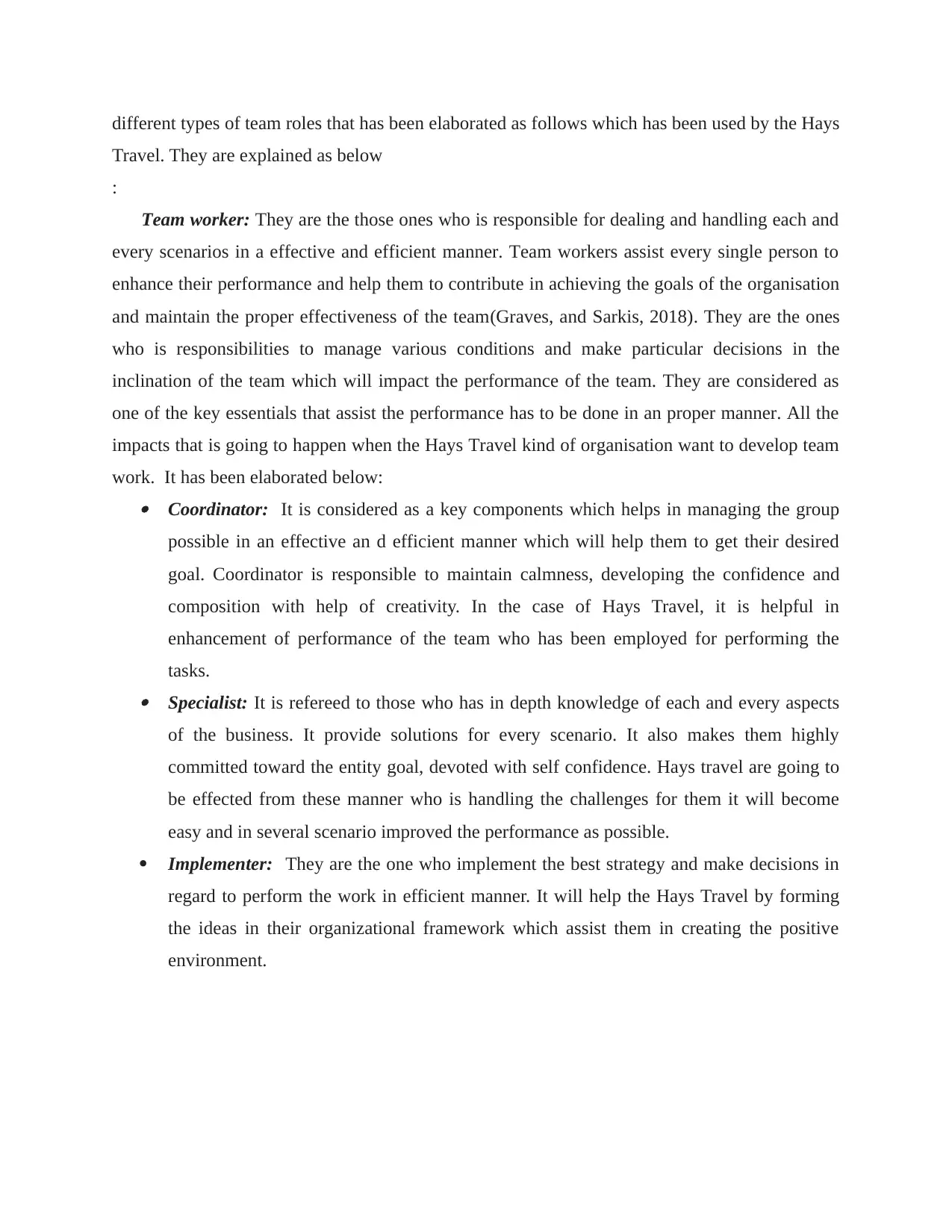
different types of team roles that has been elaborated as follows which has been used by the Hays
Travel. They are explained as below
:
Team worker: They are the those ones who is responsible for dealing and handling each and
every scenarios in a effective and efficient manner. Team workers assist every single person to
enhance their performance and help them to contribute in achieving the goals of the organisation
and maintain the proper effectiveness of the team(Graves, and Sarkis, 2018). They are the ones
who is responsibilities to manage various conditions and make particular decisions in the
inclination of the team which will impact the performance of the team. They are considered as
one of the key essentials that assist the performance has to be done in an proper manner. All the
impacts that is going to happen when the Hays Travel kind of organisation want to develop team
work. It has been elaborated below: Coordinator: It is considered as a key components which helps in managing the group
possible in an effective an d efficient manner which will help them to get their desired
goal. Coordinator is responsible to maintain calmness, developing the confidence and
composition with help of creativity. In the case of Hays Travel, it is helpful in
enhancement of performance of the team who has been employed for performing the
tasks. Specialist: It is refereed to those who has in depth knowledge of each and every aspects
of the business. It provide solutions for every scenario. It also makes them highly
committed toward the entity goal, devoted with self confidence. Hays travel are going to
be effected from these manner who is handling the challenges for them it will become
easy and in several scenario improved the performance as possible.
Implementer: They are the one who implement the best strategy and make decisions in
regard to perform the work in efficient manner. It will help the Hays Travel by forming
the ideas in their organizational framework which assist them in creating the positive
environment.
Travel. They are explained as below
:
Team worker: They are the those ones who is responsible for dealing and handling each and
every scenarios in a effective and efficient manner. Team workers assist every single person to
enhance their performance and help them to contribute in achieving the goals of the organisation
and maintain the proper effectiveness of the team(Graves, and Sarkis, 2018). They are the ones
who is responsibilities to manage various conditions and make particular decisions in the
inclination of the team which will impact the performance of the team. They are considered as
one of the key essentials that assist the performance has to be done in an proper manner. All the
impacts that is going to happen when the Hays Travel kind of organisation want to develop team
work. It has been elaborated below: Coordinator: It is considered as a key components which helps in managing the group
possible in an effective an d efficient manner which will help them to get their desired
goal. Coordinator is responsible to maintain calmness, developing the confidence and
composition with help of creativity. In the case of Hays Travel, it is helpful in
enhancement of performance of the team who has been employed for performing the
tasks. Specialist: It is refereed to those who has in depth knowledge of each and every aspects
of the business. It provide solutions for every scenario. It also makes them highly
committed toward the entity goal, devoted with self confidence. Hays travel are going to
be effected from these manner who is handling the challenges for them it will become
easy and in several scenario improved the performance as possible.
Implementer: They are the one who implement the best strategy and make decisions in
regard to perform the work in efficient manner. It will help the Hays Travel by forming
the ideas in their organizational framework which assist them in creating the positive
environment.
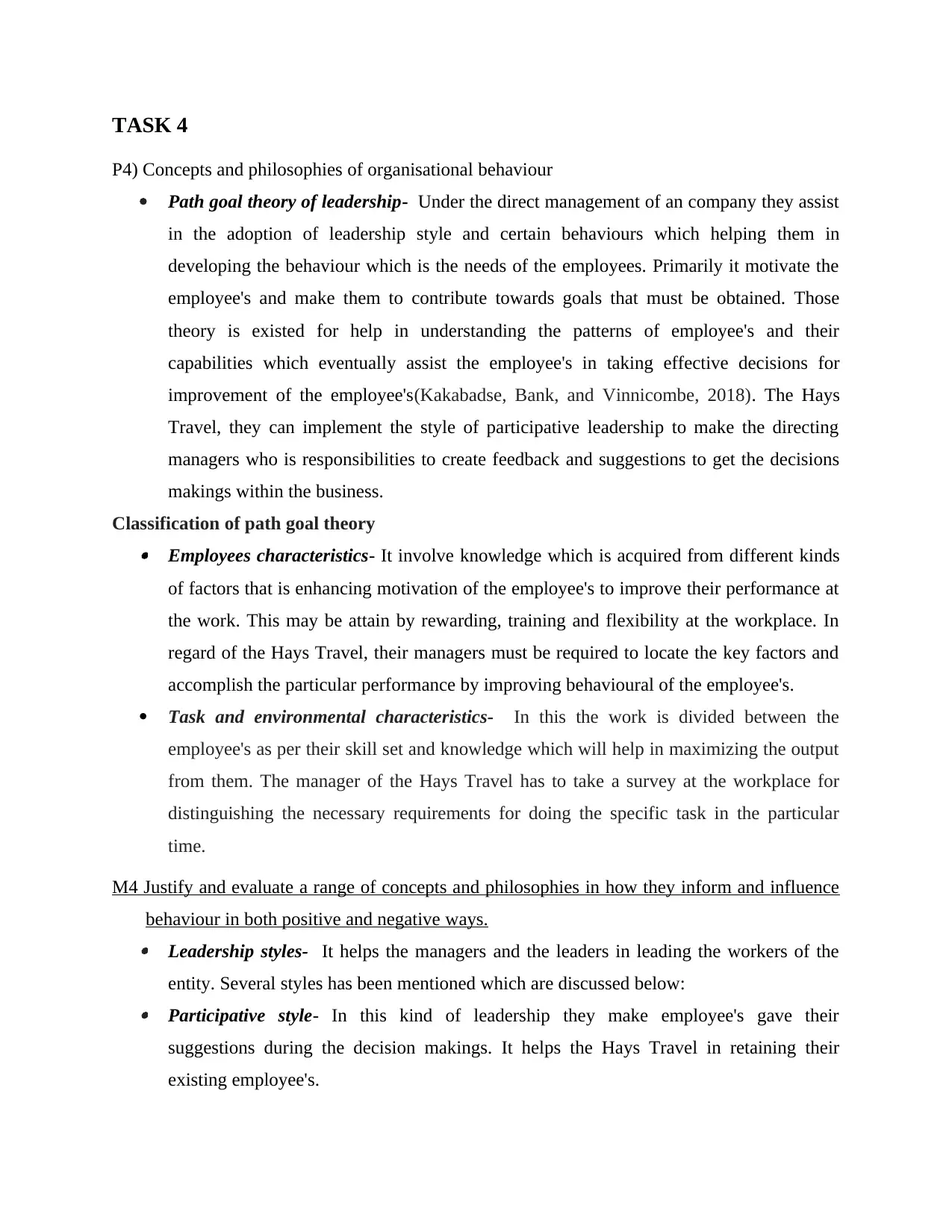
TASK 4
P4) Concepts and philosophies of organisational behaviour
Path goal theory of leadership- Under the direct management of an company they assist
in the adoption of leadership style and certain behaviours which helping them in
developing the behaviour which is the needs of the employees. Primarily it motivate the
employee's and make them to contribute towards goals that must be obtained. Those
theory is existed for help in understanding the patterns of employee's and their
capabilities which eventually assist the employee's in taking effective decisions for
improvement of the employee's(Kakabadse, Bank, and Vinnicombe, 2018). The Hays
Travel, they can implement the style of participative leadership to make the directing
managers who is responsibilities to create feedback and suggestions to get the decisions
makings within the business.
Classification of path goal theory Employees characteristics- It involve knowledge which is acquired from different kinds
of factors that is enhancing motivation of the employee's to improve their performance at
the work. This may be attain by rewarding, training and flexibility at the workplace. In
regard of the Hays Travel, their managers must be required to locate the key factors and
accomplish the particular performance by improving behavioural of the employee's.
Task and environmental characteristics- In this the work is divided between the
employee's as per their skill set and knowledge which will help in maximizing the output
from them. The manager of the Hays Travel has to take a survey at the workplace for
distinguishing the necessary requirements for doing the specific task in the particular
time.
M4 Justify and evaluate a range of concepts and philosophies in how they inform and influence
behaviour in both positive and negative ways. Leadership styles- It helps the managers and the leaders in leading the workers of the
entity. Several styles has been mentioned which are discussed below: Participative style- In this kind of leadership they make employee's gave their
suggestions during the decision makings. It helps the Hays Travel in retaining their
existing employee's.
P4) Concepts and philosophies of organisational behaviour
Path goal theory of leadership- Under the direct management of an company they assist
in the adoption of leadership style and certain behaviours which helping them in
developing the behaviour which is the needs of the employees. Primarily it motivate the
employee's and make them to contribute towards goals that must be obtained. Those
theory is existed for help in understanding the patterns of employee's and their
capabilities which eventually assist the employee's in taking effective decisions for
improvement of the employee's(Kakabadse, Bank, and Vinnicombe, 2018). The Hays
Travel, they can implement the style of participative leadership to make the directing
managers who is responsibilities to create feedback and suggestions to get the decisions
makings within the business.
Classification of path goal theory Employees characteristics- It involve knowledge which is acquired from different kinds
of factors that is enhancing motivation of the employee's to improve their performance at
the work. This may be attain by rewarding, training and flexibility at the workplace. In
regard of the Hays Travel, their managers must be required to locate the key factors and
accomplish the particular performance by improving behavioural of the employee's.
Task and environmental characteristics- In this the work is divided between the
employee's as per their skill set and knowledge which will help in maximizing the output
from them. The manager of the Hays Travel has to take a survey at the workplace for
distinguishing the necessary requirements for doing the specific task in the particular
time.
M4 Justify and evaluate a range of concepts and philosophies in how they inform and influence
behaviour in both positive and negative ways. Leadership styles- It helps the managers and the leaders in leading the workers of the
entity. Several styles has been mentioned which are discussed below: Participative style- In this kind of leadership they make employee's gave their
suggestions during the decision makings. It helps the Hays Travel in retaining their
existing employee's.
⊘ This is a preview!⊘
Do you want full access?
Subscribe today to unlock all pages.

Trusted by 1+ million students worldwide
1 out of 14
Related Documents
Your All-in-One AI-Powered Toolkit for Academic Success.
+13062052269
info@desklib.com
Available 24*7 on WhatsApp / Email
![[object Object]](/_next/static/media/star-bottom.7253800d.svg)
Unlock your academic potential
Copyright © 2020–2026 A2Z Services. All Rights Reserved. Developed and managed by ZUCOL.





